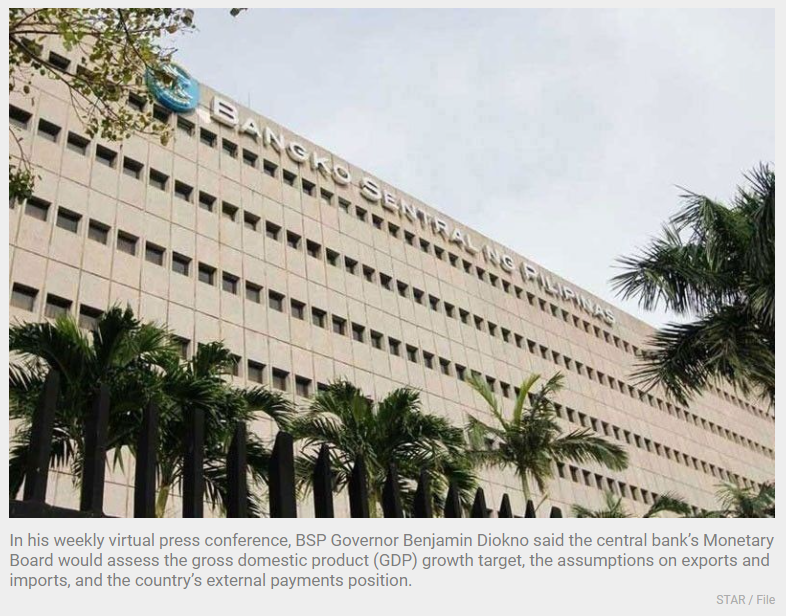Philippines: BSP to consider robust Q3 growth in reviewing targets
MANILA, Philippines — The Bangko Sentral ng Pilipinas (BSP) will take into consideration the stronger-than-expected economic expansion in the third quarter and the robust growth of both imports and exports when it reviews targets for 2021 and 2022 next month.
In his weekly virtual press conference, BSP Governor Benjamin Diokno said the central bank’s Monetary Board would assess the gross domestic product (GDP) growth target, the assumptions on exports and imports, and the country’s external payments position.
Diokno said the average 4.9 percent GDP growth in nine months this year already falls within the revised four to five percent target set by the Development Budget Coordination Committee (DBCC).
“It is already near the high end of the government’s target range for 2021. On trade, exports and imports have been robust for the first three quarters, with year-to-date growth rates exceeding our latest forecasts,” Diokno said.
According to the BSP, it sees full-year 2021 goods exports to sustain the better-than-expected performance in the first half of the year.
“This is due mainly to the broadening recovery in global economic activity amid extensive vaccine rollouts and hefty policy support in key economies,” Diokno said.
The Monetary Board set a goods exports target of 14 percent and six percent, and goods imports target of 20 percent and 10 percent for 2021 and 2022, respectively.
In the first half, goods exports jumped by 21.3 percent after slumping by 9.8 percent last year, while imports surged 31.6 percent from a 20.2 percent decline.
“Goods imports are also expected to pick up as domestic demand bounces back and as the government fast-tracks its major infrastructure initiatives,” he said.
Year-to-date figures exhibit continued recovery momentum after hitting a trough in 2020, reflecting the resumption of international trade amid sustained improvements in global and domestic demand.
Diokno said goods exports for the first half of the year already reached pre-pandemic levels, driven mainly by manufactures headlined by electronics and mineral products, among others.
Nonetheless, the BSP chief said the outlook on goods trade remains tentative as it continues to be clouded by uncertainty over the pace of global and domestic recovery, including that of the country’s major trading and investment partners.
Key upside risks to the near-term prospects for goods trade include the expected improvement in business confidence and consumer sentiment supported by the accelerated rollout of COVID-19 vaccination globally and the availability of effective treatments.
“For 2022, trade in goods is expected to sustain its growth trend but at a more moderate pace of six percent and 10 percent growth for goods exports and imports, respectively. This is due in part to base effects,” Diokno said.
According to the BSP, spending boom is also expected as consumers tap their accumulated savings for purchases halted during the pandemic.
The central bank said some downside risks that could weigh on the country’s exports and manufacturing prospects include the emergence and spread of more virulent COVID-19 variants which may result in renewed mobility restrictions and dampened consumer and business sentiment, prolonged supply chain disruptions and logistical bottlenecks depicted in delivery delays, raw material shortages and elevated shipping rates as well as slower growth in China.
“Notwithstanding these risks, the Philippine economy has sufficient buffers against external headwinds as its external sector remains healthy,” Diokno said.
He cited the adequate gross international reserves (GIR) that stood at $106.6 billion as of end September, the projected six percent growth in remittances from overseas Filipino workers, the 43.1 percent jump in foreign direct investments to $5.6 billion in the first seven months, and the 7.1 percent increase in business process outsourcing revenues, among others.
Diokno added the BSP continues to provide an enabling macroeconomic environment through its policies and initiatives in support of the external sector.
“Mindful of lingering pandemic-related challenges, the BSP is committed to pursuing necessary monetary, financial, and external sector policies and reforms supportive of the country’s economic recovery, to the extent that these are consistent with the effective discharge of its primary mandate of maintaining price and financial stability,” he said.
Source: https://www.philstar.com/business/2021/11/12/2140610/bsp-consider-robust-q3-growth-reviewing-targets


 Thailand
Thailand




